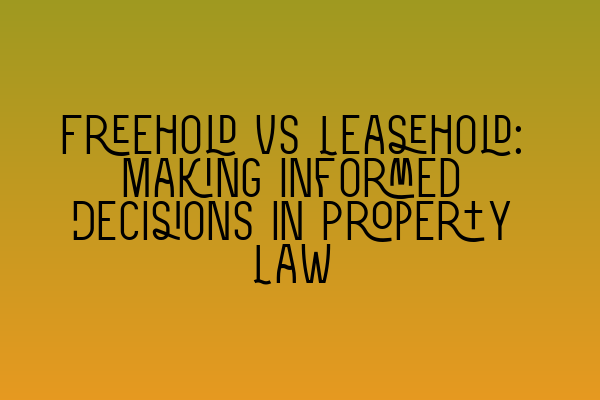Freehold vs Leasehold: Making Informed Decisions in Property Law
When it comes to property ownership, one of the first decisions you’ll need to make is whether to purchase a freehold or leasehold property. Understanding the difference between these two terms is crucial in making an informed decision that aligns with your needs and preferences. In this blog post, we’ll explore the key aspects of freehold and leasehold properties, their advantages and disadvantages, and provide you with the necessary knowledge to navigate the realm of property law confidently.
What is Freehold?
Freehold, in simple terms, refers to absolute ownership of a property and the land it sits upon. When you own a freehold property, you have complete control and ownership rights for an indefinite period. This means you possess the property and the land it stands upon outright, with no limitations or restrictions. Freehold properties are typically houses and sometimes ground-floor flats.
Advantages of Freehold:
1. Absolute Ownership: Owning a freehold property provides you with a strong sense of ownership and control. You do not have to answer to anyone regarding the use, alteration, or modification of your property.
2. No Ground Rent or Service Charges: Unlike leasehold properties, freehold properties do not require payment of ground rent or service charges to a third party.
3. Potential for Property Appreciation: Freehold properties generally have a higher value and tend to appreciate well over time, making them a sound long-term investment.
4. Independence: Freehold ownership grants you the freedom to make decisions about your property without the need for permission from outside parties.
Disadvantages of Freehold:
1. Responsibilities: As a freehold owner, you are solely responsible for the maintenance and repairs of the property and any associated costs.
2. Higher Initial Costs: Freehold properties are typically more expensive upfront compared to leasehold properties due to the added benefits of absolute ownership.
What is Leasehold?
Leasehold, on the other hand, refers to a long-term lease agreement with the freeholder (usually the landowner) for the use and occupation of a property. In a leasehold arrangement, you have the right to occupy the property for a set period, which can range from a few decades to several centuries, depending on the terms of the lease. Leasehold properties are commonly found in apartment buildings or developments with shared areas.
Advantages of Leasehold:
1. Lower Initial Costs: Leasehold properties are generally more affordable upfront, making them an attractive option for first-time buyers or those on a budget.
2. Shared Maintenance: In a leasehold property, the responsibility for maintenance and repairs is often shared with other leaseholders, reducing overall individual costs.
3. Amenities and Services: Leasehold developments often offer additional amenities and services, such as communal gardens, parking facilities, and concierge services.
4. Statutory Protection: Leasehold properties come with legal protections, including the right to challenge unreasonable service charges or lease extensions.
Disadvantages of Leasehold:
1. Ground Rent and Service Charges: Leasehold properties require payment of ground rent and service charges to the freeholder or managing agent, increasing the cost of ownership.
2. Limited Control: As a leaseholder, you may be subject to certain restrictions and regulations outlined in the lease agreement, such as obtaining permission for structural modifications or subletting.
3. Lease Extensions and Renewal: When the lease term approaches its end, leaseholders may face complex and potentially costly processes to extend the lease or negotiate its renewal.
Balancing Your Decision:
To make an informed decision between freehold and leasehold, consider the following:
1. Financial Considerations: Assess your budget and long-term financial goals to determine whether a freehold or leasehold property best aligns with your financial capabilities.
2. Lifestyle Preferences: Evaluate your lifestyle and personal preferences concerning property ownership, taking into account factors such as independence, responsibility, and the amenities available in leasehold developments.
3. Legal Advice: Seek the assistance of a qualified property law solicitor to review lease agreements, assess lease terms, and provide guidance on the legal aspects of your decision.
Conclusion:
Choosing between freehold and leasehold properties is a significant decision that should be based on careful consideration of your financial circumstances, personal preferences, and long-term goals. Whether you opt for the absolute ownership of freehold or the affordability and shared maintenance of leasehold, ensure you have a comprehensive understanding of your rights and obligations as a property owner.
For further information on property law, the SQE exams, or to access practice exams and mocks, check out the following related articles:
– SQE 1 Practice Exam Questions
– SQE 1 Practice Mocks FLK1 FLK2
– SQE 2 Preparation Courses
– SQE 1 Preparation Courses
– SRA SQE Exam Dates
At SQE Property Law & Land Law, we offer expert legal advice and comprehensive support to help you navigate the intricacies of property ownership. Contact us today for professional guidance tailored to your specific needs.
